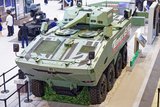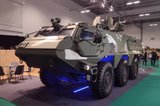Raytheon to continue LRPF work
Raytheon has secured a $116.4 million contract from the US Army to begin work on the technological maturation and risk reduction phase of the Long-Range Precision Fires (LRPF) programme, the company announced on 12 June.
LRPF aims to replace the Army Tactical Missile System with a new, longer-range surface-to-surface weapon that can defeat fixed land targets out to 499km.
Called DeepStrike, Raytheon's LRPF will fire two missiles from a single weapons pod, boost range over current systems by more than 40 percent, and will offer the army the capability to implement future upgrades to increase its versatility for future battlefield requirements.
Work under the phase will include testing missile components to ensure the design is ready for engineering and manufacturing development and live-fire demonstrations by the end of 2019.
Thomas Bussing, VP of Raytheon's advanced missile systems product line, said: ‘Raytheon can develop, test and field this new capability and deliver it to the army ahead of current expectations to replace aging weapons. LRPF gives soldiers on the battlefield overmatch capability against adversaries.’
More from Land Warfare
-
![World Defense Show 2026: Saudi Arabia’s record defence spend highlights uncertain times]()
World Defense Show 2026: Saudi Arabia’s record defence spend highlights uncertain times
Saudi Arabia’s investment in its land forces, notably in the area of air defence as recently as 30 January, is a sign of the challenges the Gulf State faces, particularly the threat from Houthi rebels in Yemen.
-
![Singapore Airshow 2026: ST Engineering’s Terrex s5 highlights hybrid power’s role in future warfare]()
Singapore Airshow 2026: ST Engineering’s Terrex s5 highlights hybrid power’s role in future warfare
Hybrid-electric drive technology may address the growing energy demands of land warfare in future.
-
![CAVS rides a wave and prepares for surge requirements as orders roll in]()
CAVS rides a wave and prepares for surge requirements as orders roll in
The Common Armoured Vehicle System is continuing to rack up orders as the British Army looks likely to become an operator of the vehicle, while Italy and Ireland are also contenders.
-
![US DoD task force’s DroneHunter acquisition lays groundwork for Replicator 2 CUAS strategy]()
US DoD task force’s DroneHunter acquisition lays groundwork for Replicator 2 CUAS strategy
As the US Department of Defense looks to counter the growing threat of uncrewed aerial systems to improve homeland security, the DroneHunter acquisition could point to future commercial innovation.
-
![Land forces review: Tanks, trucks and IFVs dominate but woes remain for Ajax]()
Land forces review: Tanks, trucks and IFVs dominate but woes remain for Ajax
This year has begun with main battle tanks taking the lead while orders for large logistics and support vehicles continued from last year. Additionally, two of the British Army’s most significant contracted vehicle programmes, Ajax reconnaissance vehicle and Challenger 3 tank, continued to make news in January.























